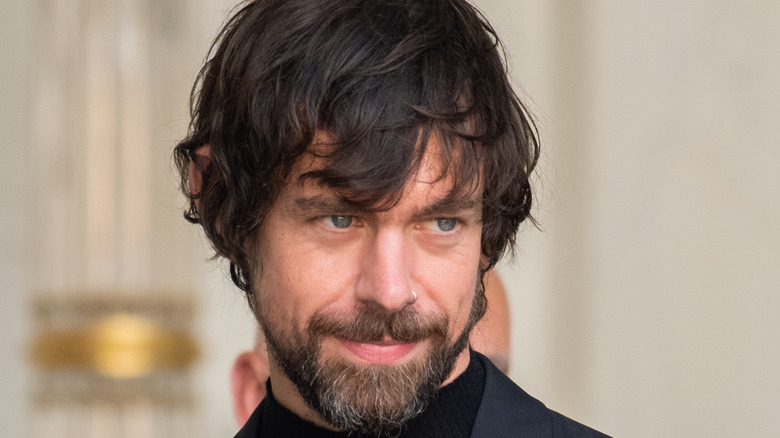Why Former Twitter CEO Jack Dorsey Says The Layoffs Are His Fault
In what one could interpret as a heartfelt message over Twitter's recent decision to lay off about half of its workforce, co-founder and former CEO Jack Dorsey recently shared his thoughts on the matter, taking responsibility for the number of jobs lost. In his tweet thread, which was published the day after new Twitter owner Elon Musk made the layoffs official, Dorsey said that the company grew too quickly under his watch, putting it in its current position.
Twitter has notoriously struggled to turn a profit, and Musk is aiming to change that — after all, he has to pay around $1 billion in interest every year (via WaPo). The ways he has gone about transforming the platform and reducing its expenses have been heavily criticized, however, as reports from inside claim that employees are working around the clock in an intense effort to hit short product deadlines. The rapid rate at which these changes have been made has seemingly made a mess of things. Sources claim Twitter is trying to get some laid off employees to come back, for example, alleging that some of the people weren't supposed to be laid off, while others reportedly have skills the company needs.
Thus far his efforts, though popular with some, seem to be backfiring; some ad companies have since distanced themselves from Twitter (and Musk's bad faith poll likely didn't help matters), and the billionaire recently complained that ad revenue has experienced a "massive" decrease (via CNN), something he blamed on "activists." Not all of the negative attention is focused on Musk, however, and it seems Dorsey has also felt the heat.
Twitter's ambition outpaced its financial reality
In a tweet published on Saturday, November 5, Dorsey encouraged Twitter's employees past and present, calling them "strong and resilient." He went on to state that "many are angry" with him, likely referring to employees who were laid off and, perhaps, other employees who now find themselves working under Musk's far less accommodating leadership. "I own the responsibility for why everyone is in this situation: I grew the company size too quickly," he explained. "I apologize for that."
I am grateful for, and love, everyone who has ever worked on Twitter. I don't expect that to be mutual in this moment...or ever…and I understand. 💙
— jack (@jack) November 5, 2022
Prior to the layoffs, Twitter had around 7,500 employees, a figure that may now be down around the 3,700 mark — that would put the workforce back to around where it was at the end of 2014. Based on data compiled by Statista, Twitter's workforce jumped from 4,900 in December 2019 up to its 7,500 headcount by the end of 2021. Twitter isn't the only company that grew its workforce numbers massively during the pandemic — Meta did something similar, and it is rumored to be gearing up for an even larger round of layoffs.
Reducing the headcount is only one aspect of Musk's plan to dial back Twitter's finances, however. Shortly after Musk took control of the company, sources claimed that teams have been tasked with finding ways to slash Twitter's infrastructure costs, something that may make it prone to outages. Musk is in a hurry to see these changes implemented, but the rate at which he is moving may make things worse. In addition to mistakes that may happen under pressure when teams have little time to evaluate projects, there's also the risk of loss of morale among the workforce due to the increased workload and the massive number of people laid off — and Musk's decision to cut perks surely isn't helping.

